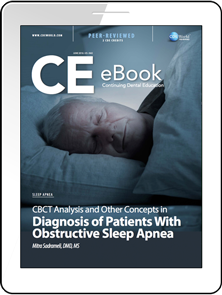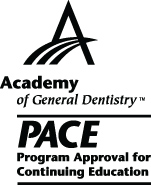CDEWorld > eBooks > CBCT Analysis and Other Concepts in Diagnosis of Patients with Obstructive Sleep Apnea


ADA CERP is a service of the American Dental Association to assist dental professionals in identifying quality providers of continuing dental education. ADA CERP does not approve or endorse individual courses or instructors, nor does it imply acceptance of credit house by boards of dentistry. Concerns or complaints about a CE provider may be directed to the provider or to ADA CERP at www.ada.org/cerp/

Approved PACE Program Provider. FAGD/MAGD credit. Approval does not imply acceptance by a state or provincial board of dentistry, or AGD endorsement. 1/1/2023 to 12/31/2028. ID # 209722.
eBook
Released: Wednesday, August 31, 2016
Expires: Friday, May 31, 2019
CBCT Analysis and Other Concepts in Diagnosis of Patients with Obstructive Sleep Apnea
By Mitra Sadrameli, DMD, MS
Commercial Supporter: KaVo Dental
Obstructive sleep apnea (OSA) is a common form of chronic sleep disorder characterized by numerous recurring episodes of partial or complete upper airway obstruction. With this condition comes significant economic and medical consequences. Imaging technology commonly used in dentistry can be employed for initial or definitive diagnosis of OSA. This article will highlight the anatomic and pathologic differences seen in 3-dimensional and 2-dimensional radiographs obtained by the dental team.
LEARNING OBJECTIVES:
-
Describe the etiology of obstructive sleep apnea (OSA)
-
Identify the anatomic landmarks whose narrowing is important in diagnosis of OSA
-
List the craniofacial skeletal abnormalities at higher risk of developing OSA
-
Explain differences between cone-beam computed tomography (CBCT), CT, and cephalometric imaging in diagnosis of OSA
About the Author
Mitra Sadrameli, DMD, MS
Private Practice, Chicago, Illinois; Clinical Assistant Professor, University of British Columbia, Vancouver, Canada; Diplomate, American Board of Oral Radiology


